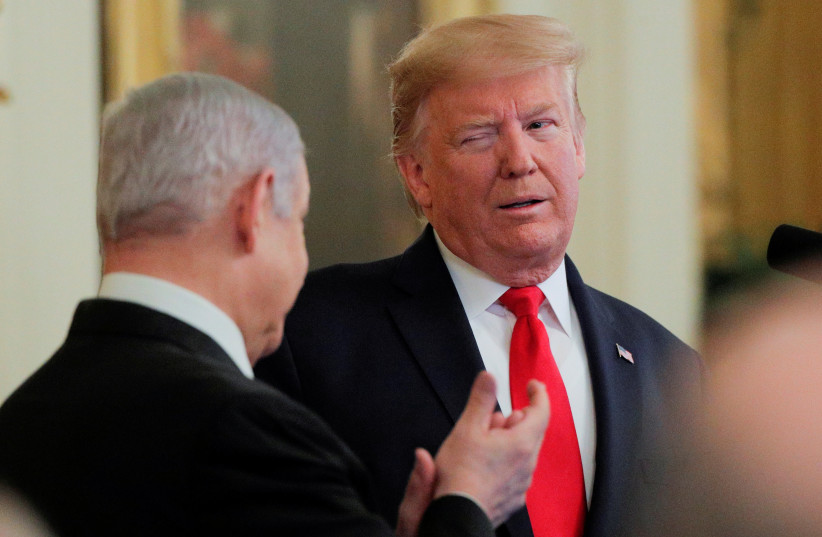Israeli annexation of West Bank settlements was scuttled within 24 hours of its July 1 deadline in 2020, according to details of the dramatic lead-up to the Abraham Accords published by Walla journalist Barak Ravid in his new book that was released over the weekend.
Ravid discussed his book Trump’s Peace: The Abraham Accords and the Reshaping of the Middle East in two Axios podcasts published Monday, called, “Trump’s Big Deal.”
“On July 1 in Jerusalem, fewer than five people in Israel knew that annexation was dying and that normalization was going to be the new game in town,” Ravid said. “For Netanyahu it was a tough moment; he decided to cut his losses. For the rest of July, the three sides hammered out a deal, its general terms were clear: normalization for stopping annexation.”
Netanyahu’s coalition agreement had allowed him to annex West Bank settlements in Area C as of July 1, but he lacked the support of the Trump administration.
Netanyahu had put the possibility of annexation on the table in slow stages during a protracted election period that began at the end of December 2018 and ended in March 2020, leading to the formation of a government in May of that year.

Then-US President Donald Trump’s peace plan had spoken of a possible eventual application of Israeli sovereignty over 30% of the West Bank. This is essentially half of Area C, which is under IDF military and civilian control.
Trump unveiled a plan to this effect in Washington in January 2020.
Ravid described how Netanyahu and many on the Israeli right had believed that Trump would allow Israel to move forward on that annexation immediately.
Even prior to the plan’s unveiling, former US ambassador David Friedman told Israel that Trump would support annexation, Ravid explained. “But Friedman didn’t let the White House know that is what he told the Israelis.”
Trump and his son-in-law, former senior White House adviser Jared Kushner “aren’t even thinking about annexation at all. They are trying to put together this peace plan to solve the Israeli-Palestinian conflict,” Ravid said.
Netanyahu, in contrast, wanted to move on it prior to the March 2020 election. There was a “massive disconnect between Trump and Bibi on this issue,” Ravid said.
When Netanyahu came to Washington for the unveiling of the Trump peace plan, “he is sure he will get an OK from Trump on annexation,” Ravid said.
Ravid described the moment when Netanyahu stood at the White House for the unveiling of the plan.
At the time, Netanyahu announced that “Israel will apply its laws to the Jordan Valley, to all the Jewish communities in Judea and Samaria and to all other areas that your plan designated as part of Israel.”
After the event, “Trump turned to his advisers and shouted what the hell was that,” Ravid described.
Unaware of the disconnect, Netanyahu told reporters later at the Blair House that he would bring the issue of annexation to a cabinet vote on Sunday.
“Trump is livid when he found out,” feeling that Netanyahu had gone a step too far, Ravid said.
The next day, under pressure from the US, Netanyahu had to walk the matter back. A month later, former ambassador to the US Ron Dermer told Kushner that Netanyahu didn’t know if he could trust Trump again and Kushner throws him out of his office, Ravid recalled.
But the issue did not go away and Netanyahu publicly only spoke of its delay. His coalition agreement with the Blue and White Party headed by Defense Minister Benny Gantz allowed him to do so as of July 1, if he had US consent.
Friedman also pushed the issue, Ravid said, flying to the US one week prior to the July 1 date to sway Trump to support Netanyahu’s sovereignty plan.
But with the COVID-19 pandemic and the elections, the White House was resistant.
There was a meeting on the matter in the Oval Office with Trump, Kushner, Friedman, former US secretary of state Mike Pompeo and Avi Berkowitz, who was the assistant to Trump and a special representative for international negotiations.
At one point, Trump turned to Pompeo and said, “if you want to do it, I don’t have a problem, Mike you decide,” according to Ravid. But then he told those in the room, “you should know that if anything bad happens, it’s on all your heads.”
Berkowitz then returns to Jerusalem with Friedman to try and sway Netanyahu not to move forward with the plan, including explaining that Israel would have to make significant concessions to the Palestinians if annexation occurred and that Israel would lose all international backing.
Netanyahu warned that he might go forward without Trump, with Berkowitz warning that he then transforms a friend into an enemy.
At the third meeting on June 30, Berkowitz suggests trading suspension of annexation for normalized relations with the United Arab Emirates. Netanyahu said he would think about it.
“Berkowitz flies home on a red-eye [flight]. He lands in Washington and on his way to the White House, on the way his phone rings and it's [UAE Ambassador] Yousef Al Otaiba,” Ravid said.
In describing the call, Berkowitz said, “it was a godsend. It was one of the best phone calls I ever had in my life. He brought up the possibility of Israel not going forward with annexation in exchange for the UAE normalizing relations with Israel. I said, ‘you might not believe this, but I had a very similar thought the other day.’”
